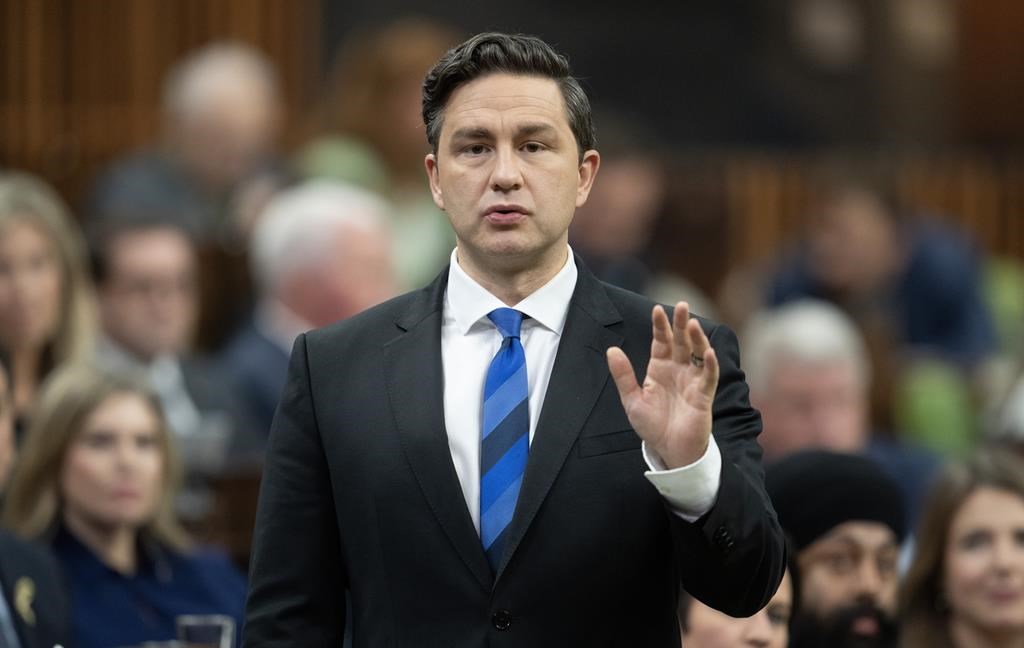Pierre Poilievre called out for Truth and Reconciliation Day photos with Inuk elder

Conservative Leader Pierre Poilievre found himself the subject of online criticism after posting photos with an Inuk elder alongside a caption about meeting with Algonquin elders on the National Day for Truth and Reconciliation.
Poilievre posted two photos to X, formerly known as Twitter, on Saturday with a caption about joining Algonquin elders and leaders at the eternal flame on Parliament Hill to mark the holiday at an event hosted by the Algonquin Nation and the National Centre for Truth and Reconciliation.
Marc Miller, the former minister of Crown-Indigenous relations, responded to Poilievre’s post by pointing out that the people in the photos are not Algonquin, but rather Inuit.
Advertisement
“We are all learning some difficult truths, particularly today, and mistakes can happens [sic],” Miller posted. “The Indigenous people in this picture are Inuit, not Algonquin, wearing Inuit traditional clothing, including Elder Manitok Thompson, who is very well known.”
MP Lori Idlout similarly confirmed it was Thompson in the photos on X, saying she is Inuk and originally from her Nunavut riding.
In one photo, Poilievre is standing head-to-head with Thompson near the eternal flame, with her hand placed on his shoulder.
The second photo taken in front of Parliament shows Poilievre standing beside Thompson and three others, including two wearing traditional Inuit clothing.
A spokesperson for Poilievre’s office said the Conservative leader was at an event led by Algonquin leaders to commemorate the day, and spoke with other Indigenous Peoples there, including “these Inuit women” who were in attendance.
Advertisement
Poilievre was seen at the event speaking with Claudette Commanda, a well-known elder and residential school survivor from Kitigan Zibi Anishinabeg, an Algonquin community located about an hour and a half away from Ottawa.
Thompson was posting about her meeting on X with Poilievre as early as Friday evening, saying she was ready to speak with him in the morning.
“My issues are Inuit priorities — elder care, health, housing, economic development, hydro opportunities, carbon tax effecting Nunavut cost of living, food security, homelessness, addiction centres,” she wrote.
After the meeting, she posted that Poilievre “took time” and listened to her. In another post, she said they prayed for Canada and “all the people who have been hurt by the residential school years.”
“I prayed to God and told him to bless Pierre for taking the time to stand with us at the ceremonies.”
Advertisement
Poilievre was at the event earlier in the day, but left before the official broadcasted events commenced.
Thompson took issue with Miller’s post, saying if politicians could work in a nonpartisan manner, implementing the Calls to Action from the Truth and Reconciliation Commission could be a quicker process.
“I speak for myself as an aboriginal, I’m not a people of pain, we want businesses, we want to own homes, we want to get ahead with our own independence, we don’t want government hand outs,” she wrote. “We were an independent people before contact. We want to be equal. We are not down cast.”
Saturday was the third year of the federal statutory holiday, adapted from the grassroots Orange Shirt Day, that recognizes the abuse suffered by Inuit, First Nations and Metis people at hundreds of state- and church-run residential schools.
Residential school survivors and Indigenous leaders were among the crowd of thousands who converged on Parliament Hill for the commemorative event, including Crown-Indigenous relations Minister Gary Anandasangaree and Governor General Mary Simon.
Advertisement
This report by The Canadian Press was first published Sept. 30, 2023.
